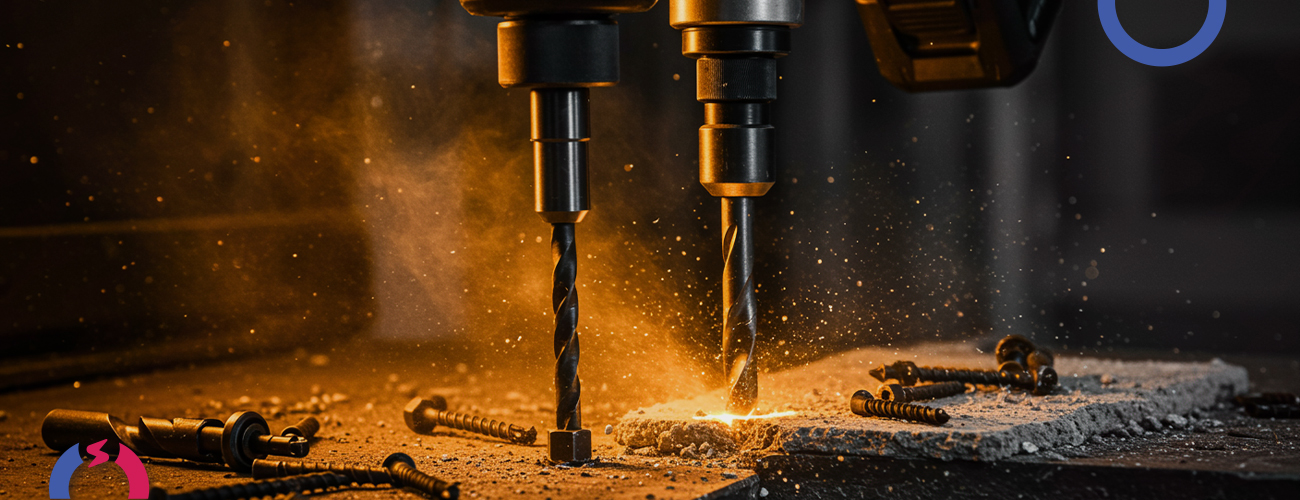When it comes to construction, carpentry, or any task involving securing materials, having the right fastening and drilling tools is crucial. Fastening tools help secure components together, while impact drilling tools provide the power needed for heavy-duty tasks like driving long screws or drilling into hard materials. In this blog, we will explore the different types of fastening and impact drilling tools, their uses, and why they are essential for both professionals and DIY enthusiasts.
What Are Fastening and Impact Drilling Tools?
Fastening tools are designed to secure materials or parts together, usually by driving screws, nails, or bolts. Impact drilling tools, on the other hand, provide the extra torque required for heavy-duty tasks such as drilling through tough materials like concrete, metal, or masonry. These tools use impact force to drive fasteners or perform high-torque drilling tasks that regular drills may struggle with.
Types of Fastening and Impact Drilling Tools:
-
Impact Drivers: Impact drivers are a powerful type of drill used for driving screws, bolts, and other fasteners into hard materials. They deliver high torque through a combination of rotational and concussive forces, which allows them to drive fasteners quickly and effectively without stripping the screw heads.
-
Impact Wrenches: Impact wrenches, also known as impact guns, provide high torque to quickly tighten or loosen bolts and nuts. These tools are commonly used in automotive repairs, construction, and industrial applications where fasteners need to be driven with extreme force.
-
Cordless Screwdrivers: Cordless screwdrivers are a more lightweight, compact option for driving screws and fasteners. These are ideal for lighter tasks where a powerful impact driver may not be necessary, such as assembling furniture or installing small fixtures.
-
Electric Screwdrivers: Electric screwdrivers are often used in both professional and DIY settings for driving screws in a wide variety of materials. They come in a variety of sizes and power levels, with some offering adjustable torque settings for better control.
-
Hammer Drills: Hammer drills are designed for heavy-duty drilling tasks, especially in concrete or masonry. These tools combine rotary motion with a hammering action, which allows them to break through harder materials. Hammer drills can be equipped with various types of drill bits to ensure versatility for different fastening and drilling tasks.
-
Drill/Driver Combos: These versatile tools combine the functions of both a drill and a screwdriver. Drill/driver combos are perfect for tasks that require drilling holes and driving screws, such as in construction and woodworking. They are available in both corded and cordless models and offer great flexibility in terms of power and usability.
-
Nail Guns: Nail guns are a popular fastening tool in construction and carpentry. They automatically drive nails into wood, metal, or other materials, saving time and effort compared to hammering. There are different types of nail guns, including framing nailers, finishing nailers, and brad nailers, each designed for specific applications.
-
Cordless Impact Drills: Cordless impact drills combine the power of an impact driver with the portability of a cordless tool. These drills are designed to handle heavy-duty drilling tasks, such as drilling into concrete, brick, or metal, while still providing the convenience of not needing an outlet.
-
Nut Drivers: Nut drivers are specialized tools designed for tightening or loosening nuts, bolts, and fasteners. These tools are often used in situations where a wrench is too bulky or impractical, providing better control and easier access in tight spaces.
Why Are Fastening and Impact Drilling Tools Essential?
-
Time Efficiency: Fastening and impact drilling tools allow for faster, more efficient completion of tasks. Whether you’re assembling a piece of furniture, installing a set of shelves, or building a structure, these tools make it possible to drive screws and drill through materials quickly and with minimal effort.
-
Increased Torque and Power: Impact drilling tools provide the torque necessary to handle difficult or dense materials. They make it possible to drill into concrete, metal, and masonry, which may be difficult for standard drills or screwdrivers. Impact drivers, in particular, excel at driving screws into hard materials without the risk of stripping the screw.
-
Precision and Control: Many fastening tools, like electric screwdrivers and cordless drills, come with adjustable torque settings. These allow users to adjust the power to suit specific tasks, such as driving screws without overdriving or damaging the material. This precision ensures that the fastener is properly secured without causing any harm to the surface or the screw.
-
Reduced Fatigue: The ergonomically designed handles of fastening and impact drilling tools help reduce hand and wrist fatigue, especially when performing repetitive tasks. This is particularly useful in professional settings where tasks may take hours to complete.
-
Versatility: These tools are versatile and can be used for a wide range of tasks. Whether you’re working with wood, metal, concrete, or other materials, there are fastening and impact drilling tools designed to meet the specific needs of each task.
Choosing the Right Fastening and Impact Drilling Tool:
-
Task Requirements: Consider the task at hand when selecting a fastening or impact drilling tool. For heavy-duty tasks, such as drilling into concrete or metal, an impact driver or hammer drill would be ideal. For lighter tasks, like assembling furniture or installing shelves, a cordless screwdriver may be sufficient.
-
Power Source: Fastening and impact drilling tools are available in both corded and cordless models. Cordless models offer the advantage of portability and ease of use, while corded models tend to offer more consistent power for extended periods of use.
-
Speed Settings: Adjustable speed settings allow you to control the tool’s output. This is particularly important for tasks that require precision or when working with different materials that require varying levels of speed to achieve the best results.
-
Ergonomics: Look for tools with ergonomic designs, such as soft-grip handles, that reduce strain on your hands and wrists. This is especially important for professionals who use these tools for extended periods.
-
Size and Weight: The size and weight of the tool can make a big difference in terms of comfort and control. Lighter, more compact models are ideal for tasks that require mobility and ease of use, while heavier models provide additional torque for tougher jobs.
-
Durability: Choose tools made from high-quality materials to ensure durability. Impact drivers and wrenches, in particular, should be sturdy enough to withstand heavy-duty applications.
Safety Tips for Using Fastening and Impact Drilling Tools:
-
Wear Protective Gear: Always wear safety glasses to protect your eyes from flying debris and ear protection if you’re working in noisy environments. Gloves can help prevent injury to your hands during extended use or when working with heavy materials.
-
Secure the Material: Ensure that the material you’re working with is securely held in place. Loose materials can shift during drilling or fastening, which could lead to injury or damage.
-
Check for Obstructions: Before you start drilling or fastening, check for any hidden electrical wires, pipes, or other obstacles. Use a stud finder to locate any potential hazards behind walls.
-
Use the Right Tool for the Job: Using the appropriate tool for the job is crucial to ensure both the safety of the user and the integrity of the materials. Never use an impact driver when a regular drill will suffice, or vice versa.
-
Work in a Well-Lit Area: Ensure that your work area is well-lit so that you can see the fasteners and materials clearly. A bright workspace can help prevent mistakes and improve accuracy.
Maintenance Tips for Fastening and Impact Drilling Tools:
-
Clean Regularly: Keep your tools clean and free from debris. Dust, dirt, and material build-up can cause the tools to malfunction and reduce their effectiveness.
-
Lubricate Moving Parts: Periodically lubricate the moving parts of your tools to keep them operating smoothly and prevent wear and tear.
-
Check for Damage: Inspect your tools regularly for signs of wear, such as loose parts or broken components. Address any damage promptly to prevent further complications.
-
Store Properly: Store your fastening and impact drilling tools in a dry, secure location to prevent rust and damage. Use toolboxes or wall-mounted organizers to keep your tools in good condition.
Conclusion:
Fastening and impact drilling tools are essential for anyone working on tasks that require precision and power. These tools provide increased efficiency, precision, and control, ensuring that materials are securely fastened or drilled with minimal effort. By choosing the right tools, following safety guidelines, and maintaining them properly, you can enhance your productivity and ensure the longevity of your tools.


